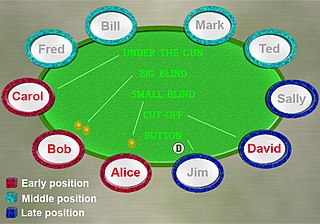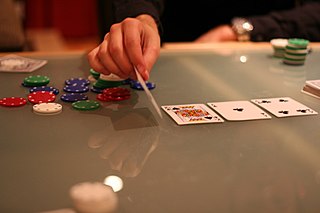This article needs additional citations for verification .(June 2007) |
Anaconda is a variety of stud poker. Other names for this game include "pass the trash", "screw your neighbor", "fuck your neighbor", and "3,2,1 left".
This article needs additional citations for verification .(June 2007) |
Anaconda is a variety of stud poker. Other names for this game include "pass the trash", "screw your neighbor", "fuck your neighbor", and "3,2,1 left".
Each player is dealt seven cards. They then each select three cards to be passed to the player on their left. These cards are simply set on the table near their left-most opponent. No players get to see their new three cards until everyone has made a pass. Afterward, the players repeat the process, only with two cards, then again with one card. Players then discard two cards to make their best five-card poker hand.
In this version of the game, up to seven people can play, passing out a total of 49 cards and having three left over.
A round of betting occurs before the first pass of three cards, then again after every card pass is made. Once players have set their hands, one card at a time is exposed, with a round of betting following each card.
Anaconda can be changed in many ways, such as:
Five-card draw is a poker variant that is considered the simplest variant of poker, and is the basis for video poker. As a result, it is often the first variant learned by new players. It is commonly played in home games but rarely played in casino and tournament play. The variant is also offered by some online venues, although it is not as popular as other variants such as seven-card stud and Texas hold 'em.

Poker is a family of comparing card games in which players wager over which hand is best according to that specific game's rules in ways similar to these rankings. While the earliest known form of the game was played with just 20 cards, today it is usually played with a standard deck, although in countries where short packs are common, it may be played with 32, 40 or 48 cards. Thus poker games vary in deck configuration, the number of cards in play, the number dealt face up or face down, and the number shared by all players, but all have rules that involve one or more rounds of betting.
Rollout or roll 'em out is poker jargon used for a game phase in certain poker variants. It is often incorrectly called "roll your own", to which it has similarities but from which it is fundamentally different.

In the game of poker, the play largely centers on the act of betting, and as such, a protocol has been developed to speed up play, lessen confusion, and increase security while playing. Different games are played using different types of bets, and small variations in etiquette exist between cardrooms, but for the most part the following rules and protocol are observed by the majority of poker players.
Five-card stud is the earliest form of the card game stud poker, originating during the American Civil War, but is less commonly played today than many other more popular poker games. It is still a popular game in parts of the world, especially in Finland where a specific variant of five-card stud called Sökö is played. The word sökö is also used for checking in Finland.
Seven-card stud, also known as Seven-Toed Pete or Down-The-River is a variant of stud poker. Until the recent increase in popularity of Texas hold 'em, seven-card stud was the most widely played poker variant in home games across the United States, and in casinos in the eastern part of the country. The game is commonly played with two to eight players, though eight may require special rules for the last cards dealt if no players fold. With experienced players who fold often, even playing with nine players is possible.

Texas hold 'em is one of the most popular variants of the card game of poker. Two cards, known as hole cards, are dealt face down to each player, and then five community cards are dealt face up in three stages. The stages consist of a series of three cards, later an additional single card, and a final card. Each player seeks the best five card poker hand from any combination of the seven cards; the five community cards and their two hole cards. Players have betting options to check, call, raise, or fold. Rounds of betting take place before the flop is dealt and after each subsequent deal. The player who has the best hand and has not folded by the end of all betting rounds wins all of the money bet for the hand, known as the pot. In certain situations, a "split-pot" or "tie" can occur when two players have hands of equivalent value. This is also called a "chop-pot". Texas hold 'em is also the H game featured in HORSE and in HOSE.
Seven Twenty-Seven is the name given a variety of Vying games similar in some respects to poker, and often played as a "dealer's choice" variant at home poker games. It uses the same cards, chips and betting system as poker, but the value of hands does not use traditional poker hand rankings, either high or low. Rather, the worth of a hand depends on only the sum of the values of the cards accepted, as in 9½-29½, or 21, a/k/a Black Jack, the modern casino game which developed from this contract via Trente-et-Un and Vingt-et-Un, its seventeenth century predecessors.

Brag is an 18th century British card game, and the British national representative of the vying or "bluffing" family of gambling games. It is a descendant of the Elizabethan game of Primero and one of the several ancestors to poker, the modern version just varying in betting style and hand rankings. It has been described as the "longest-standing British representative of the Poker family."

Mus is a card game widely played in Spain, France and Hispanic America. Originated in the Basque Country, it is a vying game. The first reference to this game goes back to 1745, when Manuel Larramendi, philologist and Jesuit Basque, quoted it the trilingual dictionary (Basque-Spanish-Latin).

Badugi is a draw poker variant similar to triple draw, with hand-values similar to lowball. The betting structure and overall play of the game is identical to a standard poker game using blinds, but, unlike traditional poker which involves a minimum of five cards, players' hands contain only four cards at any one time. During each of three drawing rounds, players can trade zero to four cards from their hands for new ones from the deck, in an attempt to form the best badugi hand and win the pot. Badugi is often a gambling game, with the object being to win money in the form of pots. The winner of the pot is the person with the best badugi hand at the conclusion of play. Badugi is played in cardrooms around the world, as well as online, in rooms such as PokerStars. Although it doesn't have its own tournament per se at the WSOP, it is featured in the Dealers Choice events as well as in the Triple Draw Mix.
Teen patti is a gambling card game that originated in the Indian subcontinent and is popular throughout South Asia. It originated in the English game of three-card brag, with influences from poker. It is also called flush or flash in some areas.
The following is a glossary of poker terms used in the card game of poker. It supplements the glossary of card game terms. Besides the terms listed here, there are thousands of common and uncommon poker slang terms. This is not intended to be a formal dictionary; precise usage details and multiple closely related senses are omitted here in favor of concise treatment of the basics.
Baduci is a combination of Badugi poker and deuce to seven triple draw, and uses hand values similar to lowball. The pot in this game is split much like high-low split between the best Badugi hand and the best 2-7 triple draw hand. The betting structure and overall play of the game is nearly identical to a standard poker game using blinds. A players' hand contains five cards, where only four cards are used to determine the best Badugi hand and five cards are used to determine the triple draw hand. During each of three drawing rounds, players can trade zero to five cards from their hands for new ones from the deck.
Stud poker is any of a number of poker variants in which each player receives a mix of face-down and face-up cards dealt in multiple betting rounds. Stud games are also typically non-positional games, meaning that the player who bets first on each round may change from round to round. The cards dealt face down to each individual player are called hole cards, which gave rise to the common English expression ace in the hole for any hidden advantage.
Poker is a popular card game that combines elements of chance and strategy. There are various styles of poker, all of which share an objective of presenting the least probable or highest-scoring hand. A poker hand is usually a configuration of five cards depending on the variant, either held entirely by a player or drawn partly from a number of shared, community cards. Players bet on their hands in a number of rounds as cards are drawn, employing various mathematical and intuitive strategies in an attempt to better opponents.
Draw poker is any poker variant in which each player is dealt a complete hand before the first betting round, and then develops the hand for later rounds by replacing, or "drawing", cards.

Community card poker refers to any game of poker that uses community cards, which are cards dealt face up in the center of the table and shared by all players. In these games, each player is dealt an incomplete hand face down, which are then combined with the community cards to make a complete hand. The set of community cards is called the "board", and may be dealt in a simple line or arranged in a special pattern. Rules of each game determine how they may be combined with each player's private hand. The most popular community card game today is Texas hold 'em, originating sometime in the 1920s.
Wall Street Poker is a form of stud poker which also features community cards. It is named after the financial district of New York and the movie of the same name, because of a strategy of aggressive bidding involved.